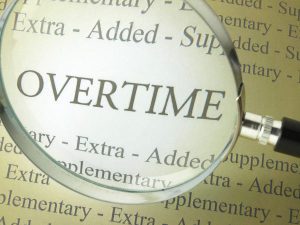CUPA-HR Submits Comments on DOL’s Overtime Proposal
 On May 21, CUPA-HR, joined by 18 other higher education associations, filed substantive comments in response to the Department of Labor (DOL)’s proposed update to the salary threshold for the “white collar” exemptions to the Fair Labor Standards Act (FLSA)’s overtime pay requirements.
On May 21, CUPA-HR, joined by 18 other higher education associations, filed substantive comments in response to the Department of Labor (DOL)’s proposed update to the salary threshold for the “white collar” exemptions to the Fair Labor Standards Act (FLSA)’s overtime pay requirements.
DOL’s update formally rescinds the 2016 rule, proposes increasing the current level of $455 per week ($23,660 annually) to $679 per week ($35,308 annually) by using the same formula it employed in 2004, and proposes requiring an update to the salary threshold every four years using the 2004 formula through notice-and-comment rulemaking. The department did not propose any changes to the existing “duties test.”
Our comments highlight higher education’s belief that an increase to the salary threshold is due and that DOL has an obligation to update the threshold from time to time to ensure the exemptions are not abused. Our comments also offer support for DOL’s decision to update the salary threshold by applying the methodology used in 2004 to current salary data and its decision not to make any changes to the duties test.
Additionally, we offer several suggestions for improving the proposal (our first three points were included in our comments to the 2016 rule and the request for information):
- First, any final rule should allow employers to prorate the salary threshold for part-time employees.
- Second, DOL should count the cost of employer-provided room and board toward the salary threshold.
- Third, while we support DOL’s decision to update the threshold only via notice and comment, we believe DOL should update the regulations every five to seven years based on circumstance, as it did prior to the 1970s, not through regularly scheduled updates. Our economy and labor markets are complex and are influenced by technological developments, immigration and other factors and do not follow any linear pattern. As such, DOL should act based on circumstance, not on a rigid schedule. We also are concerned that any automatic update — even one that involves notice and comment — may exceed DOL’s authority under the FLSA and, therefore, will be susceptible to legal challenge.
- Fourth, if DOL does decide to proceed with an automatic update, the agency should make clear that any change to the methodology used to determine the standard salary level as part of future updates would require multiple proposed rulemakings. In other words, DOL would issue the initial proposal seeking comment on the regularly scheduled update to the salary threshold using the 2004 methodology. As part of that proposal, DOL would also ask if the 2004 methodology remains appropriate. If based on the comments DOL determines it needs to change the methodology or make other adjustments to the regulation, the agency would need to propose those specific changes in a separate and subsequent rulemaking with an implementation period that accounts for the planning and expectations DOL has set by having updates on regular intervals.


